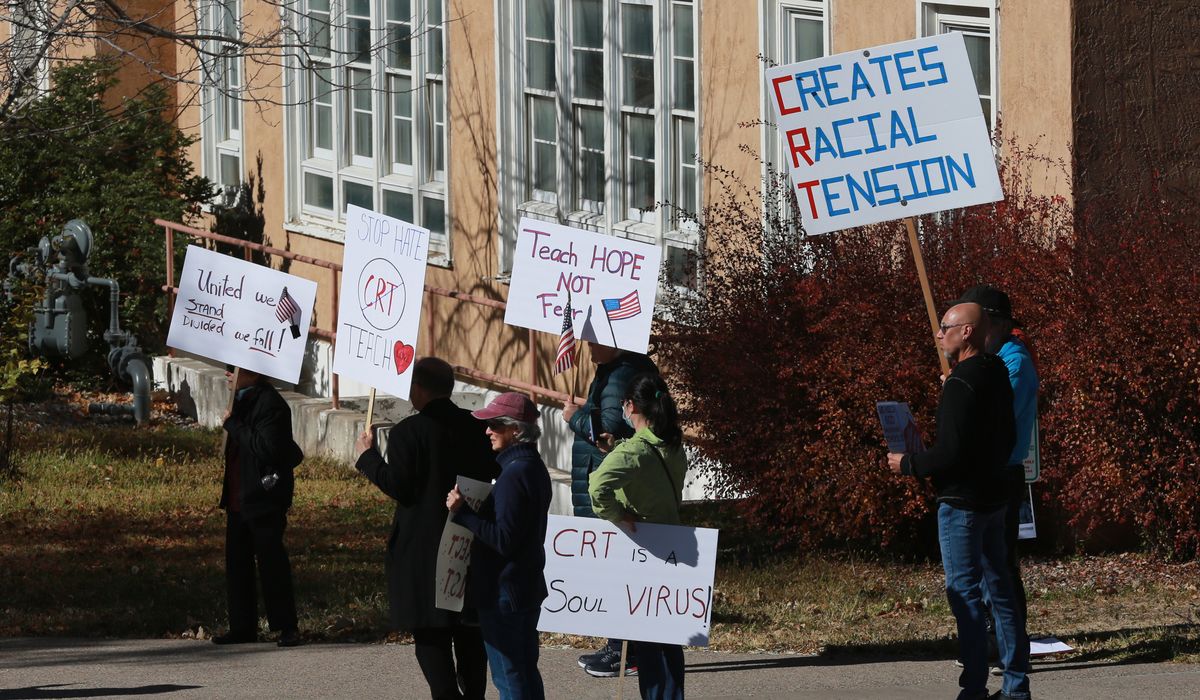
Republican state lawmakers this month have filed 56 bills to ban the teaching of critical race theory in schools and other institutions, raising to 122 the number of proposals being considered in 33 states since last January, according to a free speech advocacy group.
The New York-based PEN America said 12 of the bills have become law in 10 states: Arkansas, Arizona, Idaho, Iowa, New Hampshire, North Dakota, Oklahoma, South Carolina, Tennessee and Texas. Arizona enacted two laws, but the state Supreme Court struck down the first on a technicality. Texas combined two of its laws into one.
Jonathan Friedman, PEN America’s director of free expression and education, said the legislative activity has intensified, with 88 bills live in the current session, compared with 34 in 2021, and multiple lawmakers in the same states drafting versions.
“Either lawmakers feel pressured to keep political promises, or they feel it’s a winning issue they hope to capitalize on in the midterm elections,” Mr. Friedman said. “And this is all likely to motivate even greater censorship from all sides of the political spectrum down the line.”
This year’s bills are more focused on higher education and implementing penalties.
PEN America said 46% of the live 88 bills target higher education, compared with 26% of last year’s 34 bills. In addition, 55% propose mandatory punishment for violators, compared with 37% in 2021. Fifteen include a “private right of action” provision that would give students, parents and other citizens the right to sue schools and recover damages in court.
Several of the bills target multiple institutions. Of the 88 bills, 84 target K-12 schools, 38 target higher education and 48 include a mandatory punishment for violators.
In the Midwest, Missouri filed 18 and Indiana eight bills this month. Of the eight in Indiana, all target K-12 public schools and two also target K-12 private schools. Six would include public colleges and universities, four would include various state agencies and two would include public libraries.
Several of the bills would ban critical race theory explicitly. Others refer to “The 1619 Project” — a Pulitzer Prize-winning series that New York Times journalists introduced in August 2019 — or to more general racial attitudes that present Whites as victimizers and Blacks as victims.
Developed in graduate and law schools in the 1970s, critical race theory is an analytical tool based on Marxist critical studies. It posits that racism is a foundational element of American society and government and is important in understanding and evaluating U.S. laws, policies and programs.
Parents’ rights advocates said the bills seek to protect children from political indoctrination in the classroom.
“Parental engagement promoting an academic-focused, not activist-driven, curriculum is more important now than ever,” said Alleigh Marre, president of the school choice group Free to Learn.
Sheri Few, president of U.S. Parents Involved in Education, said the bills give priority to the right of parents to control their children’s education over the right of teachers to say what they want in class.
“Parents do have the right to direct the education of their children as an inherent right and legal right,” Ms. Few said. “Teachers who insist on presenting the world through the lens of race and sex are way out of line.”
Tamra Farah, executive director of MomForce at the nonprofit Moms for America, said she supports the bills that avoid mentioning critical race theory by name because it “is not, in fact, a curriculum in K-12 schools.”
“Rather, CRT is inculcated in school culture,” Ms. Farah said. “Its psychologically damaging tenets are passed on to kids as teachers remind them that the color of their skins alone makes them oppressors or oppressed and that there is nothing they can do to change that.”
Academic freedom advocates said the bills could create more problems than they solve for conservatives.
“I understand the danger of indoctrination in our schools, about race and everything else,” said Jonathan Zimmerman, a professor of the history of education at the University of Pennsylvania. “But the solution to that problem is to present multiple perspectives in our classrooms, not to bar certain perspectives from them.”
James Grossman, executive director of the American Historical Association, said some of the bills originate more “from a national effort to radically revise history education” than from scholarship.
“History education should help students learn what actually happened, and to think, discuss and argue with one another about roots, continuities and implications,” Mr. Grossman said. “Everything has a history, including the divisions that plague our nation and communities. To heal those divisions, our next generation must understand their evolution.”
PEN America first reported on Nov. 8 that 24 state legislatures had introduced or pre-filed 54 bills from January through September to ban “divisive” concepts such as critical race theory from lessons in K-12 schools, higher education and state agencies.
Most of those 54 bills, which the organization calls educational “gag orders,” called for limits on discussions of race, racism, gender and American history.
In December, PEN America reported that Republican lawmakers filed 12 more bills before Christmas, bringing last year’s total to 66. Republican lawmakers pre-filed 34 of these bills for the 2022 legislative session.
Republicans have full control of the legislative branches in 30 states. Only four of those states — Utah, Montana, Wyoming and Kansas — had not introduced legislation against critical race theory as of last week.
Meg Kilgannon, a senior fellow for education studies at the conservative Family Research Council, said the increasing momentum of the bills in a midterm election year will be “important to watch” as the nation’s legislatures and courts test them.
“Sure, these state bills vary in focus and quality,” Ms. Kilgannon said. “But they reflect a wholesale rejection of leftist ideology in schools and on campuses. Parents want students educated, not indoctrinated.”








